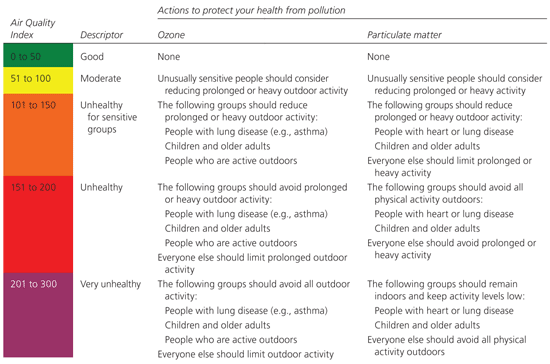
Am Fam Physician. 2010;81(2):181-182
See related article on outdoor air pollutants.
What is air pollution?
Air pollution makes the air you breathe dirty. It can be caused by gases, drops of liquid, or dust particles. Air pollution can put your health at risk. Pollution is usually man-made, but it also can come from natural sources. In the city, air pollution often comes from motor vehicles, construction, and chemical and power plants. In the country, air pollution can come from stirred-up dust, industrial activity, and fires.
How does air pollution affect my health?
It can irritate your eyes, throat, and lungs. It can make asthma worse, and can increase your chances of lung disease or heart attack. However, the risk from air pollution may be small compared with other risk factors, such as smoking.
Who is most likely to be affected by air pollution?
Some people are more sensitive to air pollution. For example, people with heart and lung problems, children, and older adults are more likely than other people to have health problems from air pollution.
How can I find out if air pollution is at unhealthy levels?
Every day, the U.S. Environmental Protection Agency (EPA) measures air pollution levels across the United States using the Air Quality Index (AQI). The AQI is a color-coded scale of air pollution levels that ranges from 0 to 500. When the AQI is higher than 100 in your area, you should think about spending less time outdoors. However, some people may be sensitive to AQI levels as low as 50. You can find out your area's AQI level by watching local weather reports, calling a local telephone hotline, or going to http://www.airnow.gov.
What can I do to protect my family and myself?
Check the AQI level in your area often. Follow the EPA's recommendations for reducing exposure based on each day's AQI level (see table). Usually, they recommend limiting exercise or staying indoors when air pollution levels are high. When ozone is elevated, the highest levels usually occur during late morning to early evening, so try to limit outdoor activity at those times.
If you live or work close to a known pollution source, or if you have a chronic heart or lung problem, talk with your doctor about other ways to deal with air pollution.

Where can I get more information?
Your doctor
American Academy of Family Physicians
American Lung Association
Web site: http://www.lungusa.org/healthy-air/
AIRNow
